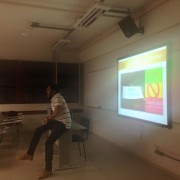Having Our English Outside The box
In over a decade teaching English, I have lost count of the many times people (students, teachers, principals, TV ads, etc) told that someone speaks good or bad English. By the time I started my (super duper) career as an English teacher, becoming a linguist was not even an option, but every time I heard something like that it did not sound good. It was as if language had to be performed in a specific manner otherwise the speaker would be burned like a witch. I do not think this is the way.
Thinking about phonetic symbols we will certainly find a an average line for pronunciation. What would this line turn out to be? Those utterances that cause no confusion, so whether you are from the countryside or the capital, Texas or San Francisco, your pronunciation will not lead you to a minimal pair situation, i.e. those small phoneme chunks that once misplaced will generate different words. In addition to minimal pairs, we can think about accent issue, a very regional linguistic feature. For countless times I also heard people (mis)judging another person’s linguistic competence due to the accent being that maybe that funny sound coming from someone’s mouth is the result of an exposure to an English that comes from northern England, Scotland, ?India, South Africa and maybe that person did not know that. Thus, saying a person speaks “good” English under a fully phonetic perspective may cause some breakdown.
Syntax, oh my beloved syntax! Those who have a linguistic educational background just like this poor writer for sure had dark days doodling syntactic trees to analyze phrases. Believing that a person is a good or bad English speaker leaning upon the syntactic elements noted in a person’s speech is understandable yet arguable. If one of our students uttered something like (1), we would certainly say that he or she is a terrible English speaker and we would even say that the student is not proficient if we compare it with (2) – nonsense!
(1) *You’s cool, man.
(2) You’re cool, man.
Of course our role as teachers is to show our students the language’s canonical manner as can be seen in (2), but labeling (1) as awful and non-proficient English is agreeing with a generative perspective of language, which in fact, even if unconsciously, is part of the behavior some of my peers have. Language does not develop as if there were labelled boxes where we can only put things that are specified in the label. As a matter of fact we can play with the boxes and their content, actually this will happen so that our students know how to explore every characteristic of the language and then they will become a highly skilled speaker once he or she will have become able to to communicate in any sort of context. If we acknowledge that there are some speech community where (1), ‘he don’t work’ among others are accepted, we will not be embarrassed by our students when we hastly correct them – with some kind of arrogant air – because they will certainly say that they had heard that type of utterance from a native speaker which, by our students’ logic, native speakers have more credibility than us. A current phenomenon that portrays metamorphosis in the language is the teen-famous ‘I can’t even‘, where ‘even’ plays a verb. This is not in the correct box, but it is certainly not considered non-proficient.
We teachers have to broaden the matter of language acquisition (Rajagopalan, 1996), because if we keep framing our students’ utterances we will never evolve in the concerns of language in general and we will remain with the biased behavior projecting language as a steady organism that does not carry any proposition, ideas, thoughts and this unfortunately has set the tone of the discussions involving native language teaching in Brazil. We need to try to understand what our students’ point is and then show them the many ways they can achieve their goal in varied contexts. What about you, teacher? How do you have your English outside the box?












GenneX Green News in Action
The program will initially connect students in the US and Brazil to facilitate environmental journalism, peer consultancy and shared documentation of actions and solutions through multiple social media platforms. The plan then intends to expand to include students in European, Asian and other countries.
GenneX Green News is a “boots in the mud,” hands-on project that can be incorporated in STEM, Social Studies and ELA/ELL/ESL classrooms and integrates service learning, place-based learning and civic participation locally and globally to enhance students’ lives. Throughout the project students will:
• Develop a community of learners and effective collaborative team.
• Use Systems Thinking methodologies to identify, address and solve local environmental issues.
• Develop relationships and a formal partnership with a least one school outside of the continental US.
• Increase capacity through peers consultants, community partners, mentors and experts.
• Demonstrate skills and knowledge critical to post-secondary education, current standards (CCSS, NGSS, NAAEE, etc.), 21st Century learning, Social-Emotional Intelligence, EdTech 2.0, Place-based Learning, Civic Education, Environmental Literacy, UN Sustainable Development Goals
• Apply academic, personal and civic rigor to all processes and products of the project
• Document and share processes and products with an authentic local and global audience
• Produce a finished final product and evaluative report about the project